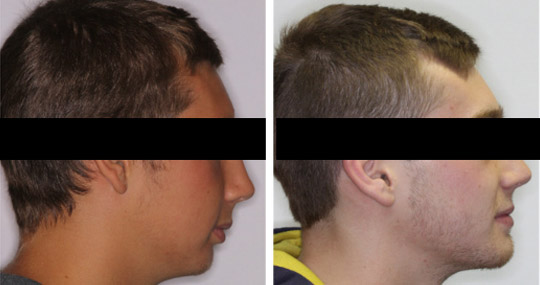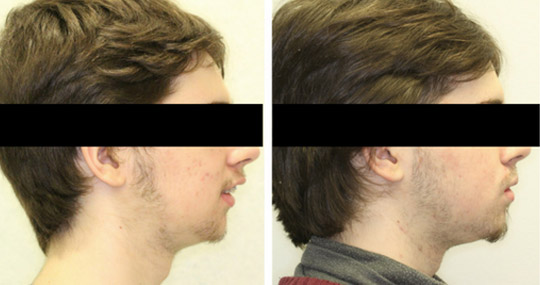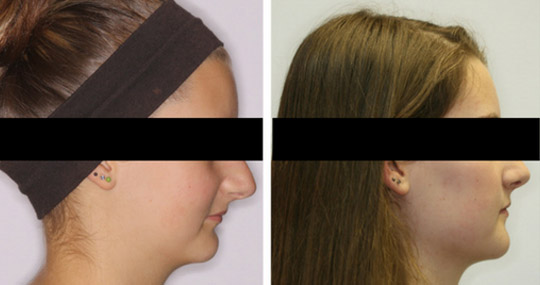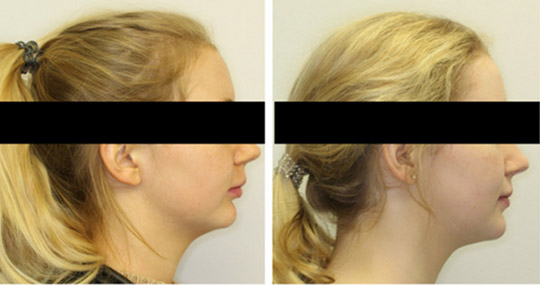Treatments
Surgical Orthodontics Before & After Photos
Dr. Virdee’s favourite patients are her surgical patients. This is because surgical orthodontic treatment always makes a dramatic improvement in the quality of life for most patients. Patients have improved self esteem because their jaws are aligned to the rest of their face, they are able to eat and function better, they breathe better and sleep without snoring and overall are happier individuals.
What is surgical orthodontics?
Orthognathic surgery or surgical orthodontics is a way of repositioning the jaws to correct irregularities in the size or position of the jaws and to improve the patients ability to chew, speak, breath as well as their appearance. Moving the jaws also moves the teeth, so braces or clear aligner therapy like Invisalign are always performed together with jaw surgery. This assures that the teeth are in a proper functioning position after surgery.
Who needs surgical orthodontics?
When you come into see us, Dr. Virdee will always go over all your treatment options with you. In patients with severe bites, we will discuss surgical and non-surgical options with you. If you are considering surgery to correct your bite or your appearance, we will refer you to some of the top orthognathic surgeons in Mississauga or Sudbury to discuss the actual procedure. Dr. Virdee will always tell you that you are not obliged to proceed with surgery unless you feel that it is the right treatment for you.
You will be referred for surgery once the jaw growth is complete – this usually takes place by age 16 for girls and 18 for boys. All growth must be completed before jaw surgery can be performed. However the pre-surgical tooth movements can begin one to two years prior to these ages.
How does it work?
Once you have decided to proceed with surgical orthodontics, we will start your treatment with either braces or Invisalign. Dr. Virdee will let you know if you are a candidate for either treatment option. During your treatment, you may notice that your bite is getting worst as your teeth line up nicely. This is normal because the surgeons will move your teeth into proper alignment during orthognathic surgery to ensure that your bite fits into its proper position.
Surgical orthodontics has four phases:
- Phase I: Presurgical orthodontics – aligns your teeth ideally
- Phase II: Surgical orthodontics – surgically move your jaws so your bite and teeth fit ideally
- Phase III: Post-surgical orthodontics – detailing and finishing of teeth position and usually lasts six months
- Phase IV: Retention – braces are taken off and retainers are used nightly
Who performs the surgery?
The surgery is performed in a hospital setting by an oral surgeon and can take several hours depending on the procedure and type of surgery. You may have to spend one or two nights in the hospital to recover. Remember, you must have your wisdom teeth removed 6 months prior to orthognathic surgery. The wisdom teeth are usually at the site where the surgeon makes incisions and segments the bone to move it. The area must be free of any teeth and must be solid to ensure proper healing after orthognathic surgery.
What happens after the surgery?
After a 4-8 week period of healing, we begin detailing and finishing the position of your teeth and bite. This usually takes between 6-12 months after which the braces are removed.
Are jaws wired shut after orthognathic surgery?
Most people incorrectly assume that their jaws will be wired shut after surgery. THIS IS NOT THE CASE. With advances in surgical orthodontics and orthognathic surgery, patients’ jaws are no longer wired shut. Instead, they wear elastics to hold the bite in place as the bone heals.
How long to I have to take time off of work or school after orthognathic surgery?
We usually estimate taking at least a week off for healing. More time may be needed if both jaws are surgically repositioned.
How does orthognathic surgery feel?
Most of our patients tell us that orthognathic surgery feels similar to getting your wisdom teeth extracted. You may have some mild pain, which will be controlled by pain relievers, there may be some swelling around your jaws (sometimes our patients have no swelling), and initially it may be difficult to open and close your mouth. It usually takes about 2-4 weeks for you to be able to function properly depending on the type of surgery and severity of your bite before surgery.
When will I be able to eat normally?
>
The experience with orthognathic surgery is very similar to the experience of having your wisdom teeth out. You will be limited to a soft food diet initially including potato salad, egg salad, ice cream (yay), smoothies, pasta and soups. Staying hydrated by drinking plenty of fluids is extremely important. After about a week of healing, as your jaws start to increase their range of motion, you will slowly be able incorporate normal foods back into your diet.
What types of surgery are possible
Surgery to the lower jaw:
In the lower jaw, the jawbone behind the teeth is separated and the tooth-bearing portion is moved forward if the jaw is recessive or backward if the jaw is protrusive.
Surgery to the upper jaw:
In upper jaw surgery, the jaw can be repositioned forward or back ward or raised or lowered. It is usually raised up (maxillary impaction) in patients with a gummy smile and brought down (maxillary down graft) in patients who don’t show teeth or gums when they smile at all.
Surgery to upper and lower jaws:
Both upper and lower jaws can be repositioned in three planes if the bite is severe enough. Usually this is indicated in patients with asymmetries in their jaws or open bites or a combination of jaw abnormalities.
Certain movements may require the jaws to be separated, with bone added/removed to achieve the proper alignment and stability. Other facial bones that contribute to alignment may also be repositioned or augmented.
If you are considering surgical orthodontics, consider Hometown Orthodontics as your top orthodontics office in Mississauga or Sudbury. We have a passion to treat patients who need surgical treatment and are always companionate and understanding with your needs.
Get a Free Consultation
We take a comprehensive approach with other doctors to your orthodontic care when it comes to complicated cases. Schedule a consultation to find out if you are a candidate for surgical orthodontics.







